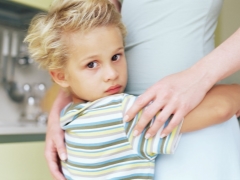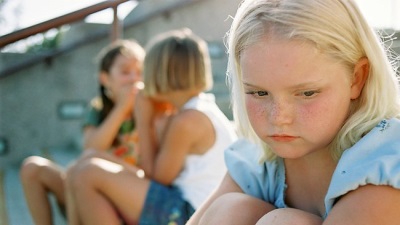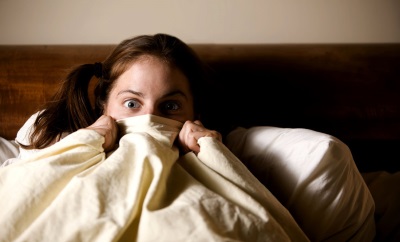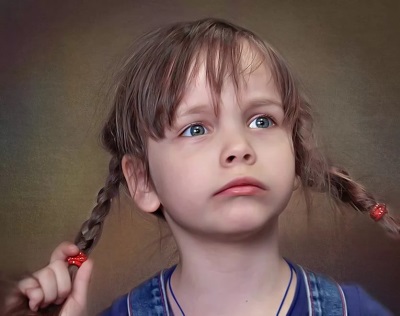What if the child is very anxious and restless?
The number of anxious and restless children is steadily increasing. As the number of anxious adults grows, for years accumulating their dissatisfaction with everything and everyone — work, financial position, housing, a car, or lack of it. Children who are raised by such adults are at risk. They are anxious. It is difficult and scary for them to live in this world. They need urgent help.
What it is?
Anxiety is a steady state of prolonged emotional discomfort. Frequent or persistent forebodings, a sense of uncertainty, are characteristic of an anxious person. Anxious most often become children - asteniki, prone to pessimism. Such a view of the world, as a rule, is copied by them from their parents.
Anxiety also lurks infants. Have you noticed that one baby is calm, and the other one often cries, behaves anxiously during feeding, has a restless sleep? Breast children, as a rule, are worried for physiological reasons - they are hungry, their diapers get wet, something hurts. If the baby sucks the breast nervously during feeding, it often loses it, most likely he is worried about colic. By 3 months of life, they retreat.
Psychological reasons for anxiety in a child can appear only by the age of 7 months, when the psyche is properly developed and ready for it.
The first psychological anxieties of the child are usually associated with the absence of the mother. If she even briefly excommunicated, the crumb demonstrates emotional arousal. By 8 months, the baby "masters" another alarm - he begins to fear outsiders. It is at the age of 7 to 9 months that it is decided whether the child will be prone to increased anxiety. At this time, he is very sensitive to musical sounds, and is able to distinguish all the intonations in his mother's voice. One careless word - and the crumb can be scared, and the emotional connection with the mother will be under threat.
Talking about possible stable anxiety is possible only when the baby is 1 year old.
Types of anxiety
Anxiety is different. It is caused by various reasons, and, therefore, needs different methods of correction.
- Congenital anxiety is genetically determined. For children, melancholic is a hereditary congenital trait. Since their infancy, such children slowly adapt to any changes in the outside world, almost always experience discomfort of a psychological kind, they are easy to "get out of the rut." Their psyche is extremely unstable.
- Situational anxiety - associated with a specific situation in which the child has experienced a strong emotional outburst. After a loud barking of a neighbor's dog, for example, he begins to be afraid of all dogs, without exception. After vaccination - afraid of all doctors. At the same time, the level of anxiety rises long before the onset of the “terrible” situation, if the child is informed about it in advance.

Such anxiety is subject to correction, but you cannot get rid of it until the end. Each of us has such familiar adults, who in their 30-40 years are afraid to fly a plane or visit a dentist.In the first case, we are dealing with "grown up" children's fears of heights and death, in the second - with the fear of pain in children and doctors.
Very often, anxiety "on the situation" is learning. This condition is complex and long. The child experiences discomfort on the eve of school-related events: he is afraid to answer at the blackboard, take exams, and write tests. And the most terrible is not the exam itself, but its waiting. This anxiety also “matures” along with the child, and persists (even if in minimal manifestations) in all adults. Remember how nervous you are on the eve of important events! Primary school students suffer more from learning anxiety. Then, as they gain experience, as they mature, they feel more competent, and the fear diminishes.
Anxious children are divided into several types:
- Neurotic. These are children with a pronounced "somatic" - they have a nervous tic, they stuttersuffer from enuresis. Children with neurotic disorders need qualified help from neuropathologists and psychiatrists.
In dealing with these guys, it is important to listen to them, no matter what the cost. You can not focus on their somatic disorders. It requires a feeling of comfort, they should feel completely safe, and know that they are accepted as they are.
In the next video you can learn more about children with neurosis. The author of the video will talk about the causes of children's neuroses and how to behave with such a child.
From corrective games, neurotics show drawing, role-playing games in which they will defeat their fears every time. Example: a child is afraid to go to the doctor, begins to cry and stutter. Ask him to draw a doctor, play the scene "In the doctor's office." Do it together, encourage the crumb to "speak out" your fears as much as possible.
The author of the next video will tell you how to see what the child is afraid of and how to help the child overcome their fear.
- Disinhibited children. These are active, very sensitive guys, but they have a lot of fears that are hidden deep down. They sincerely try to be good, behave around, get good grades. But if for some reason they fail to do so, they sharply change their tactics and begin to openly hooligans. They are not even embarrassed by the situation in which they become a laughing stock in front of a group in kindergarten or a class at school. They even like such situations, because at this moment all attention is riveted on their person. Externally disinhibited children are absolutely indifferent to criticism and comments.

From the point of view of medicine, organic disorders of a light character may be present: problems with memory, attention, fine motor skills. These guys need to create an atmosphere of success, often praise them and kindly support them in their endeavors. If they can believe in themselves, then they will stop being afraid, and their behavior will even out. They will benefit from playing sports, because heightened activity, behind which they hide their fears, needs an exit.
- Closed children. Kids that can be categorized as closed. They do not react to criticism at all, they avoid participation in the life of the collective. They do not want to participate in common games and entertainment. Prefer the role of the observer. It is difficult to make contact with both peers and adults. May generally refuse to communicate. They have problems in learning, because there is practically no motivation to learn from them.
With such children it is important to find points of contact - a topic of interest to them. It can be anything from dinosaurs to aircraft of the First World War, and then build communication through it.
- Shy children. Cute quiet, who, like the notorious brass penny, like everyone without exception.They get lost when they need to read verses in public or answer the teacher’s questions for the entire class, don’t take the initiative, and they are very executive, diligent and obligatory. Have certain communication problems. They are afraid of communication with strangers and unfamiliar people, experiencing strong (even panic) bouts of fear, when they hear someone raising his voice, even if the curses are not addressed to them. Weeping Any little thing can bring them to tears.
Shy kids will be easy and comfortable in the company of peers with similar hobbies and interests. On the part of adults, they need praise, encouragement of their achievements and constant prompts - how to find a way out of this or that situation. It’s hard for them to figure out what to do.
Experts in child psychology have long paid attention to an interesting feature: at preschool age and up to 11–12 years old, boys are the most disturbing, and after 12 years, girls suffer from increased anxiety. Moreover, adolescent girls are more concerned with relationships with people, and boys are concerned about the prospects of being punished. Having committed a bad deed, the latter are afraid that parents, teachers or girlfriends will think about them badly and refuse to communicate. Having done exactly the same ugly act, the boys are afraid of physical punishment from both parents and peers.
Signs of anxiety
Your child can be considered alarming if he has at least three of the features listed below:
- Unwillingness to go to school or kindergarten, especially after an illness or vacation.
- Fear of the unknown. The child again and again looks at the same cartoon, reads the same book. He rarely agrees to watch or read something else. He does not like new things. He is comfortable only with those who are well known.
- Excessive love of order. Several times a day, a child manically shifts pens and pencils in a pencil case, rearranges books on his desk. He does not tolerate when someone takes his school supplies or toys, and even more so then put them in the wrong place.
- Chronic excitement. The child is very nervous on the eve of exams, contests, important events in family life. Many times he asks new information for himself, requires detailed explanations of every detail.
- Increased fatigue.
- Lack of perseverance and determination. If something did not work out from the first or second time, the child throws the case altogether.
- "The guilt complex". The kid believes that it is he who is to blame for all the troubles and problems of loved ones.
Anxiety also has physical signs. Take a closer look at the baby more closely:
- Anxious children have muscle clamps in the neck and face.
- They have wet and cold hands.
- Often, anxious children complain of terrible dreams and poor appetite.
- Frequent "guests" of restless children - diarrhea, stomach upset.
- Anxious children sweat a lot when there is a minimum cause for excitement (they were assigned to do something, have a conversation with the teacher, etc.).
- Anxious boys and girls, as a rule, have a quiet voice and intense look.
- Anxious guys are extremely whiny.
In the next video, the author more widely reveals the topic of child anxiety and tells more about its signs and symptoms.
Causes of Child Anxiety
- Conflicting requirements (parents say one thing, the teacher says another. At school, they put forward some requirements, at home, others).
- Congenital character trait.
- Inflated inadequate expectations of parents that children cannot meet.
- Anxious parents.
- Unsuccessful family situation - divorce, quarrels, death of someone close, difficult financial situation.
Psychologist tips
In no case can one fight a child’s heightened anxiety by force. It will scare him even more, increase discomfort, and undermine your relationship of trust. Carefully, unobtrusively ask him about fears, let him learn to clothe his “nightmares” in words. An anxious child must be taught to look for the positive even in the negative: “Has trouble happened? Yes, it is sad. But think what good she taught us? What experience have you got? What knowledge for the future?
You can not make fun (even as a joke) of his fears and doubts. Your restless toddler should be sure that you take his problems seriously, understand their significance, and are always ready to give good advice.
It is better to inform anxious restless baby about all significant and cardinal events and changes in life. He needs you to prepare him, set him up for the right perception.
The most difficult thing for adults raising anxious children is learning to mask their own anxieties. This is an indispensable condition for successful correction of the child’s behavior. Do not show the daze that you care about something, keep Tibetan calm. But you should tell about your anxiety, and only in the past tense: "I was afraid that I would not succeed, but I managed to do my best!"
Restless child need to be taught to set goals and go to them. Including personal example. Be sure to praise them for doing in the presence of others. This will help improve self-esteem.
In the next video, a child psychologist will tell you how to properly communicate with a disturbing child.
Recommendations to parents
If we are talking about a restless child under the age of 1 year, it is important to remember a few parental “tricks” that will help the little one calm down:
- You can not leave the crying anxious baby without attention. It is not always associated with physiological causes. Perhaps the crumbs are lonely or scary.
- Disturbing tots often need to sleep together with their parents. Moreover, in relative safety, they feel only with their mother.
- No need to rush to send the child to the great swimming - let him bathe in a small bath as long as possible. Douche, swimming lessons leave for later.
In the correction of the behavior of anxious children from 1 to 15 years, there are also some nuances:
- The mode of the day and its strict observance so that the events in the child’s life are at least approximately predictable.
- Restless guys, regardless of age, do not like to change clothes, so their clothes should be as simple as possible. What is easy and convenient, and most importantly - quickly, it was possible to remove and put it on.
- Try not to prepare complex dishes consisting of many ingredients for disturbing offspring. They find it difficult to understand what exactly is in the composition of your culinary masterpiece, and eating such food is likely to be refused.
- Anxious children will be useful to master the technique of therapeutic deep breathing, light meditation. Yes, and it does not hurt parents.
- Anxious children need a massage, it allows you to remove muscle clamps. After the massage, you can carry out water treatments and aromatherapy sessions. Benefit will play therapy.
In case of children's neuroses, it is worth using various techniques described in the video of a clinical psychologist Veronika Stepanova.



















